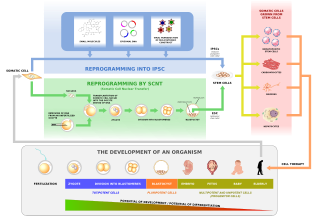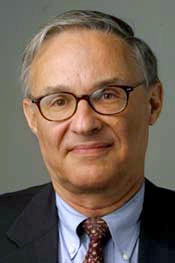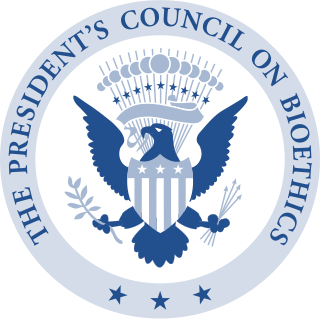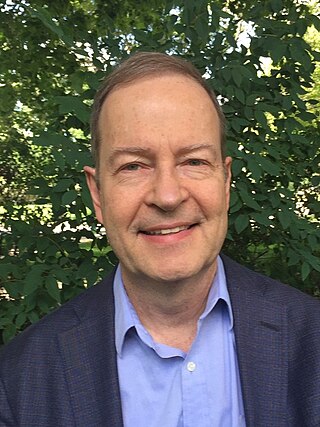
Human cloning is the creation of a genetically identical copy of a human. The term is generally used to refer to artificial human cloning, which is the reproduction of human cells and tissue. It does not refer to the natural conception and delivery of identical twins. The possibilities of human cloning have raised controversies. These ethical concerns have prompted several nations to pass laws regarding human cloning.
Bioethics is both a field of study and professional practice, interested in ethical issues related to health, including those emerging from advances in biology, medicine, and technologies. It proposes the discussion about moral discernment in society and it is often related to medical policy and practice, but also to broader questions as environment, well-being and public health. Bioethics is concerned with the ethical questions that arise in the relationships among life sciences, biotechnology, medicine, politics, law, theology and philosophy. It includes the study of values relating to primary care, other branches of medicine, ethical education in science, animal, and environmental ethics, and public health.

Leon Richard Kass is an American physician, scientist, educator, and public intellectual. Kass is best known as a proponent of liberal arts education via the "Great Books," as a critic of human cloning, life extension, euthanasia and embryo research, and for his tenure as chairman of the President's Council on Bioethics from 2001 to 2005. Although Kass is often referred to as a bioethicist, he eschews the term and refers to himself as "an old-fashioned humanist. A humanist is concerned broadly with all aspects of human life, not just the ethical."

The President's Council on Bioethics (PCBE) was a group of individuals appointed by United States President George W. Bush to advise his administration on bioethics. Established on November 28, 2001, by Executive Order 13237, the council was directed to "advise the President on bioethical issues that may emerge as a consequence of advances in biomedical science and technology". It succeeded and largely replaced the National Bioethics Advisory Commission, appointed by President Bill Clinton in 1996, which expired in 2001.
Gregory Stock is an American biophysicist, best-selling author, biotech entrepreneur, and the former director of the Program on Medicine, Technology and Society at UCLA’s School of Medicine. His interests lie in the scientific and evolutionary as well as ethical, social and political implications of today's revolutions in the life sciences and in information technology and computers.

The Hastings Center is an independent, nonpartisan bioethics research institute and think tank based in Garrison, New York. It was instrumental in establishing the field of bioethics and is among the most prestigious bioethics and health policy institutes in the world.
George J. Annas is the William Fairfield Warren Distinguished Professor and Director of the Center for Health Law, Ethics & Human Rights at the Boston University School of Public Health, School of Medicine, and School of Law.

Lori B. Andrews is an American professor of law. She is on the faculty of Illinois Institute of Technology Chicago-Kent College of Law and serves as Director of IIT's Institute for Science, Law, and Technology. In 2002, she was a visiting professor at Princeton University. She received her B.A. summa cum laude from Yale College and her J.D. from Yale Law School. Andrews is a Fellow of the Hastings Center.
Stem cell research policy varies significantly throughout the world. There are overlapping jurisdictions of international organizations, nations, and states or provinces. Some government policies determine what is allowed versus prohibited, whereas others outline what research can be publicly financed. Of course, all practices not prohibited are implicitly permitted. Some organizations have issued recommended guidelines for how stem cell research is to be conducted.
The Institute on Biotechnology and the Human Future (IBHF) is an affiliate of the Illinois Institute of Technology (IIT) and is housed at IIT's Chicago-Kent College of Law. The IBHF was founded in 2004 by Lori Andrews, J.D., and Nigel M. de S. Cameron, Ph.D., to discuss and analyze the ethical, legal, and social implications of biotechnologies.
Wesley J. Smith is an American lawyer and author, a Senior Fellow at the Discovery Institute's Center on Human Exceptionalism, a politically conservative non-profit think tank. He is also a consultant for the Patients Rights Council. Smith is known for his criticism of animal rights, environmentalism, assisted suicide and utilitarian bioethics. He is also the host of the Humanize podcast.
Robin Alta Charo is the Warren P. Knowles Professor of Law and Bioethics at the University of Wisconsin–Madison and a leading American authority on bioethics. She holds appointments in both Wisconsin's law school and medical school.

Insoo Hyun is the Director of Research Ethics and a faculty member of the Center for Bioethics and senior lecturer on Global Health and Social Medicine at Harvard Medical School. He also serves as the Inaugural Director of the Center for Life Sciences and Public Learning at Boston's Museum of Science. As a Fulbright Scholar and Hastings Center Fellow, Dr. Hyun's interests include ethical and policy issues in stem cell research and new biotechnologies.
Michael Alan Grodin is Professor of Health Law, Bioethics, and Human Rights at the Boston University School of Public Health, where he has received the distinguished Faculty Career Award for Research and Scholarship, and 20 teaching awards, including the "Norman A. Scotch Award for Excellence in Teaching." He is also Professor of Family Medicine and Psychiatry at the Boston University School of Medicine. In addition, Dr. Grodin is the Director of the Project on Medicine and the Holocaust at the Elie Wiesel Center for Judaic Studies, and a member of the faculty of the Division of Religious and Theological Studies. He has been on the faculty at Boston University for 35 years. He completed his B.S. degree at the Massachusetts Institute of Technology, his M.D. degree from the Albert Einstein College of Medicine, and his postdoctoral and fellowship training at UCLA and Harvard University.

Françoise Elvina BaylisFISC is a Canadian bioethicist whose work is at the intersection of applied ethics, health policy, and practice. The focus of her research is on issues of women's health and assisted reproductive technologies, but her research and publication record also extend to such topics as research involving humans, gene editing, novel genetic technologies, public health, the role of bioethics consultants, and neuroethics. Baylis' interest in the impact of bioethics on health and public policy as well as her commitment to citizen engagement]and participatory democracy sees her engage with print, radio, television, and other online publications.

S. Matthew Liao is an American philosopher specializing in bioethics and normative ethics. He is internationally known for his work on topics including children’s rights and human rights, novel reproductive technologies, neuroethics, and the ethics of artificial intelligence. Liao currently holds the Arthur Zitrin Chair of Bioethics, and is the Director of the Center for Bioethics and Affiliated Professor in the Department of Philosophy at New York University. He has previously held appointments at Oxford, Johns Hopkins, Georgetown, and Princeton.

Judit Sándor is a Hungarian lawyer, bioethicist, and author, as well as full professor at the Department of Political Science, Department of Legal Studies and the Department of Gender Studies of the Central European University (CEU), Budapest. She had a bar exam in Hungary before she conducted legal practice at Simmons & Simmons in London. In 1996 she received Ph.D. in law and political science at the Hungarian Academy of Sciences.
Eric M. Meslin PhD FRSC FCAHS is a Canadian-American philosopher-bioethicist and current President and CEO of the Council of Canadian Academies (CCA).

John F. Kilner is a bioethicist who held the Franklin and Dorothy Forman endowed chair in ethics and theology at Trinity International University, where he was also Professor of Bioethics and Contemporary Culture and Director of Bioethics Degree Programs. He is a Senior Fellow at The Center for Bioethics & Human Dignity (CBHD) in Deerfield, Illinois, where he served as Founding Director until Fall 2005.

Vardit Ravitsky is a bioethicist, researcher, and author. She is a full professor at the University of Montreal and a senior lecturer on Global Health and Social Medicine at Harvard Medical School. She is immediate-past president and current vice-president of the International Association of Bioethics, and the director of Ethics and Health at the Center for Research on Ethics. She is a Fellow of the Pierre Elliott Trudeau Foundation, where she Chaired the COVID-19 Impact Committee. She is also Fellow of The Hastings Center and of the Canadian Academy of Health Sciences.










